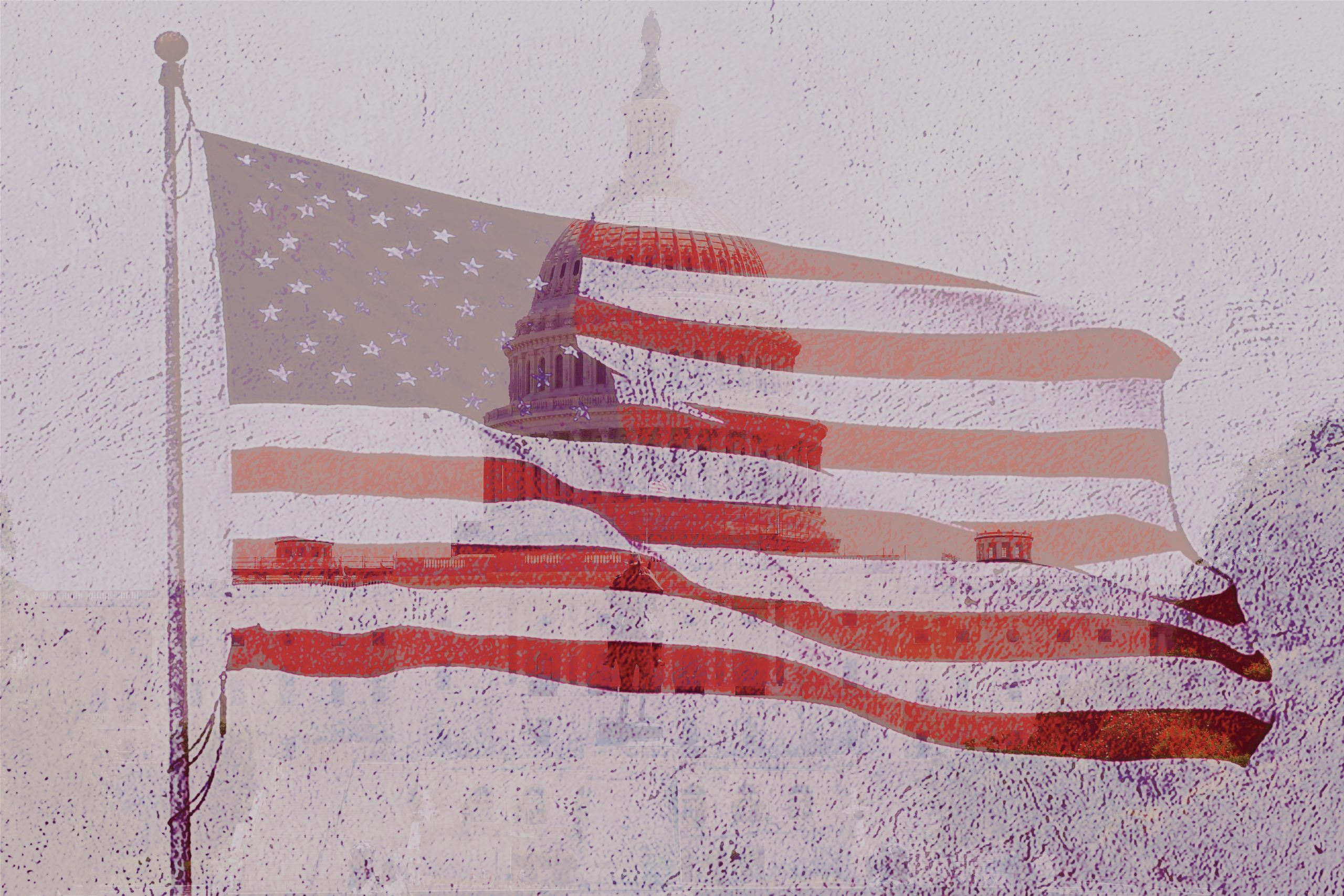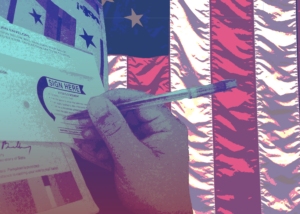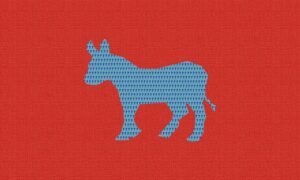On Jan. 6, 2021, Francin Vasquez (CAS ’25) arrived back in D.C. from her home in New York City. As she got off the train in Union Station, she noticed a massive crowd wearing Trump presidential campaign merch. She quickly realized that these were the same people she had just seen online storming the U.S. Capitol.
“There was a lot of red. A lot of hats, lots of flags, people unmasked,” she said. “It was people coming back from the Capitol, they were trying to take the train or the metro back home.”
Immediately, she was on high alert. In the Union Station food court, rioters stood in line behind her. Feeling unsafe, she called her friends but was unable to tell them exactly what was happening.
“I did not feel safe saying anything, especially as a woman and a woman of color, like, what is it for them to start saying slurs towards me?” Vasquez said. “Or, God forbid, they get violent, or something like that. So I [made] myself small, not say[ing] anything. I was lucky to get an Uber.”
For Vasquez and countless other D.C. residents, the Jan. 6 insurrection remains front of mind four years later. As the Nov. 5 general election approaches, questions of election security, denial, and safety have permeated the city’s collective consciousness.
On Jan. 6, 2021, thousands of insurrectionists attacked the U.S. Capitol and the law enforcement officers protecting it in an attempt to stop the certification of President Joe Biden’s election. Their five-hour-long siege led to seven deaths and more than $2.8 million in damage. Since then, more than 1,488 defendants have been charged with insurrection-related offenses, at least 944 of whom have been sentenced. According to a Justice Department press release, the government is continuing to investigate and is searching for a number of individuals believed to have participated in violence against members of law enforcement.
President Trump has promised to pardon those convicted in connection with Jan. 6 and enact “retribution” against his opponents. He was impeached by Congress as a result of his actions before Jan. 6 including that he “repeatedly issued false statements asserting that the Presidential election results were the product of widespread fraud and should not be accepted by the American people.”
The memory and perpetrators of Jan. 6 continue to promote election denial and incivility across the country, according to Thessalia Merivaki, an associate teaching professor at the McCourt School of Public Policy and associate research professor at the Massive Data Institute.
“The stakes are higher—and I’m not talking about candidates. I’m talking about the impact of the environment on those current elections. Election officials are threatened, they’re harassed, they’re targeted,” Merivaki said.
Since 2020, Merivaki has served as the co-director of the Election Officials Communications Tracker, which analyzes the communications methods of local election officials on social media. “Stolen election” rhetoric was partly responsible for creating an atmosphere conducive to election related violence, Merivaki said. President Trump and his allies began and continue to spread this rhetoric as part of their “Stop the Steal” narrative. Jan. 6 participants were manipulated into believing that what they were doing was not only right but necessary to save America, she argues.
“When people are angry and they genuinely feel that the election is taken from them, and democracy, the way they describe it in their minds, is being taken away. It makes, from one perspective, sense that we have to do something to save America, right? And that something means take arms and go and storm into buildings,” she said.
While the U.S. has seen sporadic acts of election violence this year like ballot dropbox fires and attacks on poll workers, Merivaki believes that those actions don’t represent the feelings of the majority of Americans. Instead, she sees the perpetrators as being manipulated by claims of election fraud, similar to 2020.
“I want to hope that those are bad faith actors, but [they] might be driven from genuine concerns that the elections are being stolen, and they don’t know how else to deal with it, but this is obviously domestic terrorism,” Merivaki added.
Ahead of the election, the Voice reached out to the United States Capitol Police, D.C. Metro Police Department (MPD), and the Georgetown University Police Department (GUPD) and to learn about preparations for the election, the inauguration, and the months in between, including the certification of the election—the impetus for the Jan. 6 riot.
Capitol Police declined to comment, telling the Voice, “we do not have a public statement ahead of the election.”
MPD wrote to the Voice that they are working with “local, state, and federal partners” to prepare for the presidential election and inauguration, and that further details regarding security, road closures, and any other impacts will be shared later in the year.
“We recognize the importance of upholding the First Amendment rights of individuals to peacefully express their views, and we are committed to facilitating lawful demonstrations while maintaining public order,” an MPD spokesperson wrote to the Voice. “While there has been no indication of any large-scale protests, events, demonstrations, or violent activities, MPD encourages the public to remain vigilant.”
At Georgetown, university officials say they are taking measures to ensure the campus remains safe and students are informed about what’s going on in the greater D.C. area. The university is in “close contact” with local and federal law enforcement agencies in order to maintain community safety, according to a university spokesperson.
“When there is a specific safety concern anywhere on the Hilltop or Capitol campus, our public safety officers take appropriate measures, some of which may include increased patrols, signage and public awareness campaigns, community messages and safety reminders, additional training for relevant safety staff, and working with campus partners to initiate any other physical changes needed to ensure the safety of the university community,” a university spokesperson wrote to the Voice.
The spokesperson encouraged students to sign up to receive HOYAlerts, the university’s emergency communication system, as well as AlertDC, the D.C. government’s emergency alert system. The university also shared resources in several emails to the student body ahead of the election, including information about security measures on both the Hilltop Campus and Capitol Campus.
While the Hilltop might feel like an isolated bubble, students at the Capitol Campus, which houses Georgetown’s Law school and the Capitol Applied Learning Lab (CALL) are just one mile from the U.S. Capitol.
While students at the CALL are concerned about security around the election, many are also confident that Georgetown has taken necessary steps to protect them.
“No matter who wins, we’re looking at some kind of demonstration or something,” Olivia Mason (CAS ’26), a CALL resident, said. “And so I guess I’m definitely worried about it, but I wouldn’t say I feel uncomfortable, especially not in my dorm.”
Mason explained that at the beginning of the year, CALL students had an orientation regarding general safety and security, which helped her feel more informed. She said that in the past year, Georgetown has developed more safety mechanisms for students, both during the election and year-round.
“If we just want to go down the road, or if you want to go to a grocery store nearby, we can go grab the safety shuttle instead of driving or walking or scootering,” she said. “And now there’s a lot more accessibility for students to contact an MPD or GUPD officer when they want an escort anywhere on the Capitol campus.”
For Georgetown students interning on Capitol Hill, security is also top of mind. Alex Rieger (CAS ’27), a current intern for Rep. Susie Lee (D-NV), believes Capitol Police is prepared for any potential political violence.
“I wouldn’t say I’m necessarily concerned. I think, or at least I have hope, that people have kind of learned from Jan. 6,” Rieger said. “I’m hoping that, obviously there’ll be, after the election, or leading up to it, a much larger presence of Capitol Police.”
Merivaki agrees and hopes that students are able to put some of their fears to rest, believing that the lessons learned from the insurrection have informed this year’s security and efforts to protect the democratic process.
“Election officials are prepared,” she said. “There’s much more cooperation and coordination among different stakeholders, especially geared towards rapid response and taking measures to minimize harms, that includes the Georgetown community.”
Students who have had a seat at the table in discussions about election security also feel that lawmakers are well-prepared. Luke Hughes (CAS ’27) currently serves as an intern for the U.S. House of Representatives Sergeant at Arms, William McFarland, and has witnessed security preparations surrounding the election and inauguration.
“Working for the Sergeant at Arms has made me feel in a much safer position, now that I see what goes on behind the scenes and how I’ve seen what people have learned since four years ago,” he said.
Hughes said that if he feels secure, he hopes his classmates and fellow Americans will too.
“If only everyday Americans could sit in on a meeting and hear the Sergeant at Arms say it, I think they would feel better,” Hughes said.







